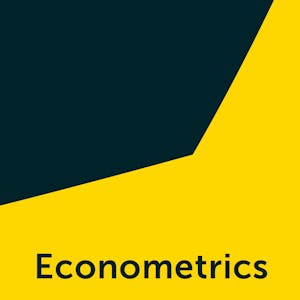Econometrics Methods and Applications
Welcome!Do you wish to know how to analyze and solve business and economic questions with data analysis tools? Then Econometrics by Erasmus University Rotterdam is the right course for you, as you learn how to translate data into models to make forecasts and to support decision making.
What do I learn?
When you know econometrics, you are able to translate data into models to make forecasts and to support decision making in a wide variety of fields, ranging from macroeconomics to finance and marketing. Our course starts with introductory lectures on simple and multiple regression, followed by topics of special interest to deal with model specification, endogenous variables, binary choice data, and time series data. You learn these key topics in econometrics by watching the videos with in-video quizzes and by making post-video training exercises.
Do I need prior knowledge?
The course is suitable for (advanced undergraduate) students in economics, finance, business, engineering, and data analysis, as well as for those who work in these fields. The course requires some basics of matrices, probability, and statistics, which are reviewed in the Building Blocks module. If you are searching for a MOOC on econometrics of a more introductory nature that needs less background in mathematics, you may be interested in the Coursera course “Enjoyable Econometrics” that is also from Erasmus University Rotterdam.
What literature can I consult to support my studies?
You can follow the MOOC without studying additional sources. Further reading of the discussed topics (including the Building Blocks) is provided in the textbook that we wrote and on which the MOOC is based: Econometric Methods with Applications in Business and Economics, Oxford University Press. The connection between the MOOC modules and the book chapters is shown in the Course Guide – Further Information – How can I continue my studies.
Will there be teaching assistants active to guide me through the course?
Staff and PhD students of our Econometric Institute will provide guidance in January and February of each year. In other periods, we provide only elementary guidance. We always advise you to connect with fellow learners of this course to discuss topics and exercises.
How will I get a certificate?
To gain the certificate of this course, you are asked to make six Test Exercises (one per module) and a Case Project. Further, you perform peer-reviewing activities of the work of three of your fellow learners of this MOOC. You gain the certificate if you pass all seven assignments.
Have a nice journey into the world of Econometrics!
The Econometrics team
None
Syllabus
Syllabus - What you will learn from this course
Week 1
Welcome Module
Welcome!
Simple Regression
Week 2
Multiple Regression
Week 3
Model Specification
Week 4
Endogeneity
Week 5
Binary Choice
Week 6
Time Series
Week 7
Case Project
Week 8
OPTIONAL: Building Blocks
FAQ
When will I have access to the lectures and assignments?
Access to lectures and assignments depends on your type of enrollment. If you take a course in audit mode, you will be able to see most course materials for free. To access graded assignments and to earn a Certificate, you will need to purchase the Certificate experience, during or after your audit. If you don't see the audit option:
The course may not offer an audit option. You can try a Free Trial instead, or apply for Financial Aid.
The course may offer 'Full Course, No Certificate' instead. This option lets you see all course materials, submit required assessments, and get a final grade. This also means that you will not be able to purchase a Certificate experience.
What will I get if I purchase the Certificate?
When you purchase a Certificate you get access to all course materials, including graded assignments. Upon completing the course, your electronic Certificate will be added to your Accomplishments page - from there, you can print your Certificate or add it to your LinkedIn profile. If you only want to read and view the course content, you can audit the course for free.
Is financial aid available?
Yes. In select learning programs, you can apply for financial aid or a scholarship if you can’t afford the enrollment fee. If fin aid or scholarship is available for your learning program selection, you’ll find a link to apply on the description page.
Reviews
Course was very well structured, pacing was very pleasant (albeit a little fast for the chapter about time series). Teachers were top notch! I had lots of fun while learning . Thank you!
This course is really good for recapping what you have learned before. It would be a difficult course if you start it without previous background.
Great beginners course. Should be backed by readings. Exercises are awesome especially the building blocks. Looking forward to a more advanced course.
The design of the course is very Helpful and efficient. The course is well explained. The instructors are very clear and master the subject. They very detailed and well organized.
